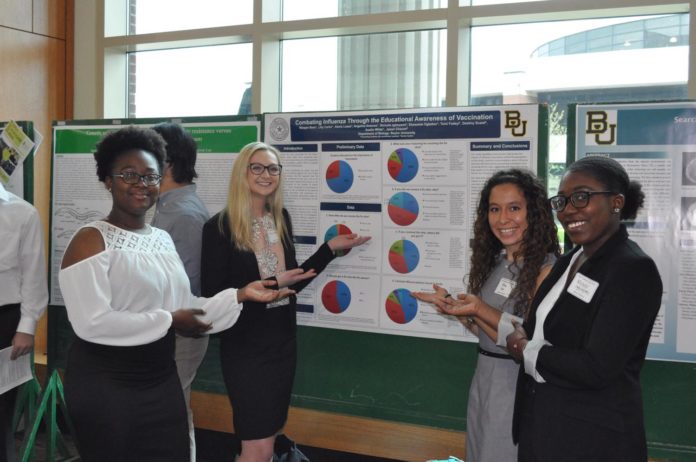
By Meredith Howard | Staff Writer
The Student Association for Vaccination Education has only been at Baylor for about a year but is already conducting research and making efforts to educate the student body about the science behind vaccination.
SAVE “supports current scientific consensus with an emphasis on objective data,” according to their Connect website, and part of its goal is to increase the percentage of students at Baylor who are receiving vaccinations.
“Vaccinations do decrease the incidents of disease, and that has been proven over multiple studies over decades,” Waco senior Angelica Anzures, SAVE’s president, said. “We are raising awareness for what would happen if we didn’t get vaccinated, especially with the anti-vax movement becoming more and more prevalent.”
Canyon Lake senior Jillian Schley, SAVE’s public relations chair, also said scientific studies point to the effectiveness of receiving vaccinations.
“The consensus is vaccines are necessary, and they’re great. We just really want to support that,” Schley said.
Both Anzures and Schley expressed concerns about the anti-vax movement in relation to SAVE, but they said they haven’t experienced any problems at Baylor with that movement.
“I anticipated a lot of push-back, but actually on campus there hasn’t been a lot of hostile people, Anzures said. “Actually, I haven’t experienced anyone hostile with our events or group.”
One opportunity that SAVE provides to all of its members is to participate in research opportunities in the hopes of gathering data to increase the use of vaccines at Baylor.
“We send out a survey – we’re collecting data on what the current status of vaccination use is on campus. We ask questions like, ‘Did you get the flu vaccine this year?’ If you did not, why did you not receive the vaccine? Was it because religious preference – was it because of cost or availability? And so we ask questions like that, and we just analyze where the community is at, and we’ll meet the community wherever they’re at,” Anzures said.
Anzures said she hopes to expand SAVE’s research pool into the Waco community in the future, and she is passionate about vaccination because misconceptions can have dangerous consequences.
“There’s this idea of herd immunity, that if these young, healthy people are not getting their vaccines, then they could potentially pass it on to someone who is at risk for illness like infants, or the elderly, and those people are the ones that are dying,” Anzures said. “A lot of people don’t know that influenza kills thousands of people every single year in the U.S., not [only] in other countries, it kills people here.”
While SAVE’s goal is to increase the use of vaccines, Anzures said she recognizes that vaccines are not a perfect solution to disease.
“We acknowledge that vaccines are not a perfect science, and no science ever is,” Anzures said. “There’s a lot of room to grow as far as immunization technology goes, but if people are so closed off to the idea that they are not discussing them, or even vaccines as an option, then the science is going nowhere; no one is going to fund those studies.”
SAVE meets from 6:30 to 7 p.m. on Tuesdays in B14 Baylor Sciences Building. Anzures said meetings are open to the whole Baylor community, including non-members. For more information about SAVE, contact angelica_anzures@baylor.edu.





